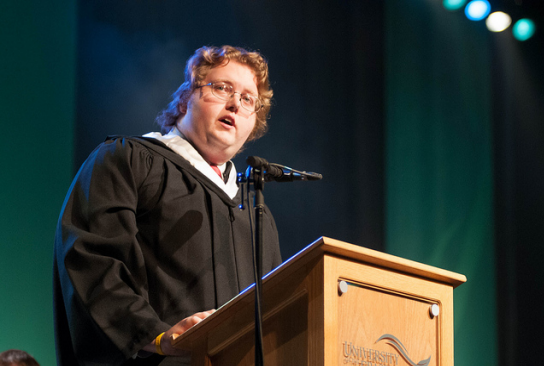
Today, I find my own city and country adrift. It is an unsettling feeling, to stand in a space that is not quite right. The moorings that so many of us have come to expect, that so many of us have lived with for so long are gone. The structures of prosperity and optimism that once stood immutable in towns and minds all across this country have become as unstable and lacklustre as my grade point average. Not simply the institutions but the ideas manifest within them are now unstuck and unglued; adrift, like all of us.
My name is Jack, and after too many semesters to count and perhaps too long a time putting it off, I am graduating from the University of the Fraser Valley. I have been here since the autumn of 2006, which sounds like eons ago, but I still remember my first day more vividly than my most recent lecture. There were no dormitories then, or arenas, and the hallways and doors were painted a different colour. It was easier to find parking, and the student pub was still called Casey’s. We were still a university-college, rather than a university, and I certainly did not expect to be standing here before all of you now. No, in those first days and first semesters I was gripped with the terror and excitement that any new phase of life brings. I had left behind the indentured service of high school for the ivory tower, and what lay before me was sheer possibility.
Only now, at the very end of my undergraduate experience, can I even begin to make sense of it, and this institution.
Despite what the technocrats might tell you, the function of the university has been more or less constant for the past thousand years. From the foundation of the Universities of Paris and Oxford, the corpus of students and scholars have pursued the diligent study of philosophy, law, music, theology, and natural science as ends in themselves. And it is because of this that the university itself is a revolutionary body, an institution unfettered by the thousand petty little orthodoxies that hold sway from one century to the next. I said at the very beginning that our institutions and our selves have become unmoored; that we are adrift and unglued. I said that because too many within this place have forgotten—perhaps willfully—the revolutionary origins of the university, and sought to stifle its operation.
Too many bureaucrats, instructors, and students have begun to think of this place not as the shining bastion of a free and open society, but as a mere factory for credentials. I am no longer a pupil, or a student, but a “Full Time Equivalent.” I am present here not to flourish as a human being, but to get a job.
Such a base instrumentality would be merely amusing were it not so dangerous and widespread. No class or cadre is immune from its falsehoods, however well-intentioned they may be. I came here as the first in my family in three generations to make a serious go of university. My father could see no future for me as a commercial fisherman, and neither could I; so I came here to study, and initially I was quite ready to do so simply to secure white collar employment afterwards. But when I was exposed to the classics, forced to read Plato and Aristotle and Thucydides, confronted with the spectre of Anscombe, made to feel the weight of Nussbaum and Tutu and Goethe – when all of these things and countless more were arrayed against me, I could do nothing but think, and think hard. About my life, about my condition, and the condition of my peers, my fellow citizens. I could do nothing but think of all of the injustice, great and small, that drapes itself all across all our activities. I was forced, against my will and ignorance, to contemplate.
Never before in my life had I encountered a place that did that, that does that. Everywhere I had ever been previously demanded of me and of everyone else allegiance in varying degrees. Unspoken, uncritical, a loyalty and blind trust, for good or ill. This place, at its very best, liberates each and every one of us, student or otherwise, from this banality.
And so, we—the graduates of this place—have the burden of duty to carry forward with us. We must first remember, for our own sakes, our education, revolutionary as it is. And then we must go forth and join battle, to find all of those injustices, the big ones and the small ones, and right them. We cannot be deterred, whether from our own weakness or the malicious lethargy of those that came before. Our age is one of unemployment, of a malaise in our economy and in our hearts that makes everyone a pessimist. It leads ourselves to question the value of reading Avicenna and Hemingway, and opens the path to a sapping of the spirit. To give in to this urge, to throw down our arms is to rob the world of our creativity, of our passions, and of our reason.
A significant period in my life has come to a close, and it has in your lives too. I do not know what will happen next, what moves I will make, what jobs I might hold, and this uncertainty is made all the more frightening by the absence of a new morning. My friends, my brothers and sisters, we have a duty to our loved ones, to our fellow citizens, and yes, even to our enemies. We must remember; we must better ourselves, and we must bring forth all of our talents into this world and not shrink from the adversity that awaits us.
And of course, we must defend this place. But not simply the poorly painted “strawberry” walls of the buildings or the overpriced hamburgers from the privatized cafeteria, but the very idea of the university. It’s that thing that animates everything which we have done here, that keeps the staff and faculty and even the bureaucrats going, even if they don’t know it. It is the revolutionary proposition that knowledge has value simply because it is knowledge; that education is open to any man or woman from whatever place and whatever background; that the freedom to think differently, to debate, and yes, even disagree with authority is an activity worth celebration, not condemnation.
That’s a tall order for twenty-somethings, even thirty-somethings or forty-somethings; or in the case of my friend Russ, more than sixty-something. But we can do it.
My name is Jack, and however unmoored I might feel, however despondent or frightened, my time here is at a close. It was worth it, even with all of the frustrations. I hope it was worth it for you too; because, my dear friends, there is still so much for us—every one of us—to do.
It’s time to conquer the world.
Thank you.




